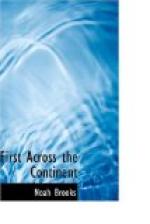To add to their difficulties, game had almost entirely disappeared, and the abundant fish in the river could not be caught for lack of proper fishing-tackle. Timber from which canoes could be made, there was none, and the rapids in the rivers were sharp and violent. With his Indian guide and three men, Captain Clark now pressed on his route of survey, leaving the remainder of his men behind to hunt and fish. He went down the Salmon River about fifty-two miles, making his way as best he could along its banks. Finding the way absolutely blocked for their purposes, Captain Clark returned on the twenty-fifth of August and rejoined the party that he had left behind. These had not been able to kill anything, and for a time starvation stared them in the face. Under date of August 27, the journal says:—
“The men, who were engaged last night in mending their moccasins, all except one, went out hunting, but no game was to be procured. One of the men, however, killed a small salmon, and the Indians made a present of another, on which the whole party made a very slight breakfast. These Indians, to whom this life is familiar, seem contented, although they depend for subsistence on the scanty productions of the fishery. But our men, who are used to hardships, but have been accustomed to have the first wants of nature regularly supplied, feel very sensibly their wretched situation; their strength is wasting away; they begin to express their apprehensions of being without food in a country perfectly destitute of any means of supporting life, except a few fish. In the course of the day an Indian brought into the camp five salmon, two of which Captain Clark bought and made a supper for the party.”
Two days later, Captain Clark and his men joined the main party, having met the only repulse that was suffered by the expedition from first to last. Eluding the vigilance of the Indians, caches, or hiding-places, for the baggage were constructed, filled, and concealed, the work being done after dark. The weather was now very cold, although August had not passed. Ink froze in the pen during the night, and the meadows were white with frost; but the days were warm, even hot.
In the absence of Captain Clark, his colleague and party had been visited by Cameahwait and about fifty of his band, with their women and children. Captain Lewis’ journal says:—
“After they had camped near us and turned loose their horses, we called a council of all the chiefs and warriors, and addressed them in a speech. Additional presents were then distributed, particularly to the two second chiefs, who had, agreeably to their promises, exerted themselves in our favor. The council was then adjourned, and all the Indians were treated with an abundant meal of boiled Indian corn and beans. The poor wretches, who had no animal food and scarcely anything but a few fish, had been almost starved, and received this new luxury with great thankfulness. Out of compliment to the chief,




